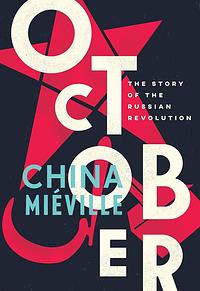Take a photo of a barcode or cover
At its best describing the more dramatic events, rather dry when describing interminable meetings. Also some wordplay that I found off-putting. But readable and a great introduction to the story of 1917.
We've been watching The Americans on Prime of late, and I found myself wanting to know more about the background and creation of the Soviet Union. We did learn about the Russian revolution in school, but this was some 20 years ago by now and before starting this book I think what I remember about it could have been summed up in these words: "October, 1917, Lenin, Trotsky, Romanovs".
Audio books and non-fiction are usually not a good match for me, as I really need a tighter narrative in order to keep my mind from wandering (usually I listen to audio books while exercising, doing chores or on public transport), but I decided to give this one a try. Since the writer primarily writes fiction, I figured he might write slightly more compellingly than the authors of those dreaded high school text books. And he does. However, it's still not quite enough to keep my attention and I did find I drifted in and out a bit. Additionally, there's a lot of different people, dates and organisations (oh, the bureaucracy!) involved and loyalties swap back and forth a bit too, so it's all kind of a muddle.
To be fair, it seems like the Russian revolution (or, I should say revolutionS really) are a bit of a muddle, generally.
The book takes us through the revolution of 1905, which led to major constitutional reform, and then there's a lead-up to the famous October revolution going through the major political and social events per month of the year 1917. It also touches briefly on the horrific aftermath and Stalin's reign of terror, and I find myself almost getting wistful along with the author for what could have been. Surely this was not what Lenin and his fellow revolutionaries had envisioned for their brave new world (in fact, one of Lenin's last political actions before his death was to warn his countrypeople against Stalin's increasing power).
Although this seems organised and orderly, like I mentioned, there's a lot of back and forth and quite frankly an astonishing lack of inaction, that still makes it a little hard to follow. At least on audiobook.
However, I do feel like I gained a rudimentary understanding of this important political event. I can see the causalities and links more clearly. Partly there was resistance towards the Romanovs (so much so that emperor Nicolas II was more or less forced to abdicate in March 1917), and resistance to WWI. There was mass poverty, polarisation and misinformation. And because the Russian empire was so large, there were a myriad of smaller conflicts and misunderstandings within it. Honestly, it reminds me quite a bit of the current situation in the United States (and indeed to some extent much of the West).
What I found most surprising was the apparent reluctance of any party or movement to claim power or do, well, anything. All they seem to do is form committees and committees for committees. Then they change this name a little bit and that person moves from this party to that, someone writes a strongly worded letter, etc. I guess the level of bureaucracy should not be surprising after having read Kafka's The Trial, but I still felt myself getting frustrated with these Russian revolutionaries.
I expect the book is probably a decent introduction to the Russian Revolution (I'm just going to go ahead and assume that the author got his facts right), and I do feel like I learnt something, but it ultimately failed to make history come alive.
One thing the book did for me was make me realise how little I still know, which really is also a good thing. I consider myself a socialist (in fact in my misspent youth I was a member of the socialist youth party), but there is so much I don't know or have forgotten about the roots of socialism (and by extension communism) and about the Soviet Union. I'm tempted to make a bit of a project out of it, though it is perhaps better saved for winter (Das Kapital and The Communist Manifesto don't exactly scream beach read).
Audio books and non-fiction are usually not a good match for me, as I really need a tighter narrative in order to keep my mind from wandering (usually I listen to audio books while exercising, doing chores or on public transport), but I decided to give this one a try. Since the writer primarily writes fiction, I figured he might write slightly more compellingly than the authors of those dreaded high school text books. And he does. However, it's still not quite enough to keep my attention and I did find I drifted in and out a bit. Additionally, there's a lot of different people, dates and organisations (oh, the bureaucracy!) involved and loyalties swap back and forth a bit too, so it's all kind of a muddle.
To be fair, it seems like the Russian revolution (or, I should say revolutionS really) are a bit of a muddle, generally.
The book takes us through the revolution of 1905, which led to major constitutional reform, and then there's a lead-up to the famous October revolution going through the major political and social events per month of the year 1917. It also touches briefly on the horrific aftermath and Stalin's reign of terror, and I find myself almost getting wistful along with the author for what could have been. Surely this was not what Lenin and his fellow revolutionaries had envisioned for their brave new world (in fact, one of Lenin's last political actions before his death was to warn his countrypeople against Stalin's increasing power).
Although this seems organised and orderly, like I mentioned, there's a lot of back and forth and quite frankly an astonishing lack of inaction, that still makes it a little hard to follow. At least on audiobook.
However, I do feel like I gained a rudimentary understanding of this important political event. I can see the causalities and links more clearly. Partly there was resistance towards the Romanovs (so much so that emperor Nicolas II was more or less forced to abdicate in March 1917), and resistance to WWI. There was mass poverty, polarisation and misinformation. And because the Russian empire was so large, there were a myriad of smaller conflicts and misunderstandings within it. Honestly, it reminds me quite a bit of the current situation in the United States (and indeed to some extent much of the West).
What I found most surprising was the apparent reluctance of any party or movement to claim power or do, well, anything. All they seem to do is form committees and committees for committees. Then they change this name a little bit and that person moves from this party to that, someone writes a strongly worded letter, etc. I guess the level of bureaucracy should not be surprising after having read Kafka's The Trial, but I still felt myself getting frustrated with these Russian revolutionaries.
I expect the book is probably a decent introduction to the Russian Revolution (I'm just going to go ahead and assume that the author got his facts right), and I do feel like I learnt something, but it ultimately failed to make history come alive.
One thing the book did for me was make me realise how little I still know, which really is also a good thing. I consider myself a socialist (in fact in my misspent youth I was a member of the socialist youth party), but there is so much I don't know or have forgotten about the roots of socialism (and by extension communism) and about the Soviet Union. I'm tempted to make a bit of a project out of it, though it is perhaps better saved for winter (Das Kapital and The Communist Manifesto don't exactly scream beach read).
A confusing number of characters (many of them with too-similar names!) obsessing over the narcissism of small differences and seemingly-meaningless factional conflicts. Too much of the narrative propulsion hinged on coincidences and misunderstandings. Miéville is usually better at plotting a story than this!
dark
emotional
funny
hopeful
informative
inspiring
reflective
sad
fast-paced
challenging
informative
medium-paced
Listened to the audiobook instead of reading it. Probably a mistake, as I had a hard time staying focused.
While the overall story is interesting, I'm not a fan of the writing style. The author also stated they wanted to write it as a story rather than a history book, but I think they missed the mark on this. It drills down into the minutiae of the infighting between the various factions vying for power ad nauseam to the point where your eyes gloss over. While the story of the Russian revolution is one worth studying, this book isn't a good starting point.
challenging
informative
I traveled to Russia a couple months ago, so the geography of the city of St. Petersburg was still fresh on my mind as I was reading this.
I'm really stuck by several things:
1. The flexibility and resourcefulness of the Bolsheviks. There is no rigid socialist orthodoxy that contained them as they pushed for total liberation.
2. Politics is all about faith and credibility. If people believe you're legit, you're legit. I was amazed when the MRC took over from all the Provisional Government garrisons without a fight. Just, "We'll take it from here."
3. A lot of the wisdom of the Bolsheviks was in tempering extreme leftist moods with the reality of the current situation. I was struck that the Bolsheviks did their best to obstruct the insurrection of the July Days, knowing that the peasants in the countryside wouldn't yet be in favor of overthrowing the government. Regardless of their own particular ideology, they were committed to moving the whole country together, developmentally.
4. The support of the military is absolutely essential in a revolution.
I'm really stuck by several things:
1. The flexibility and resourcefulness of the Bolsheviks. There is no rigid socialist orthodoxy that contained them as they pushed for total liberation.
2. Politics is all about faith and credibility. If people believe you're legit, you're legit. I was amazed when the MRC took over from all the Provisional Government garrisons without a fight. Just, "We'll take it from here."
3. A lot of the wisdom of the Bolsheviks was in tempering extreme leftist moods with the reality of the current situation. I was struck that the Bolsheviks did their best to obstruct the insurrection of the July Days, knowing that the peasants in the countryside wouldn't yet be in favor of overthrowing the government. Regardless of their own particular ideology, they were committed to moving the whole country together, developmentally.
4. The support of the military is absolutely essential in a revolution.
informative


